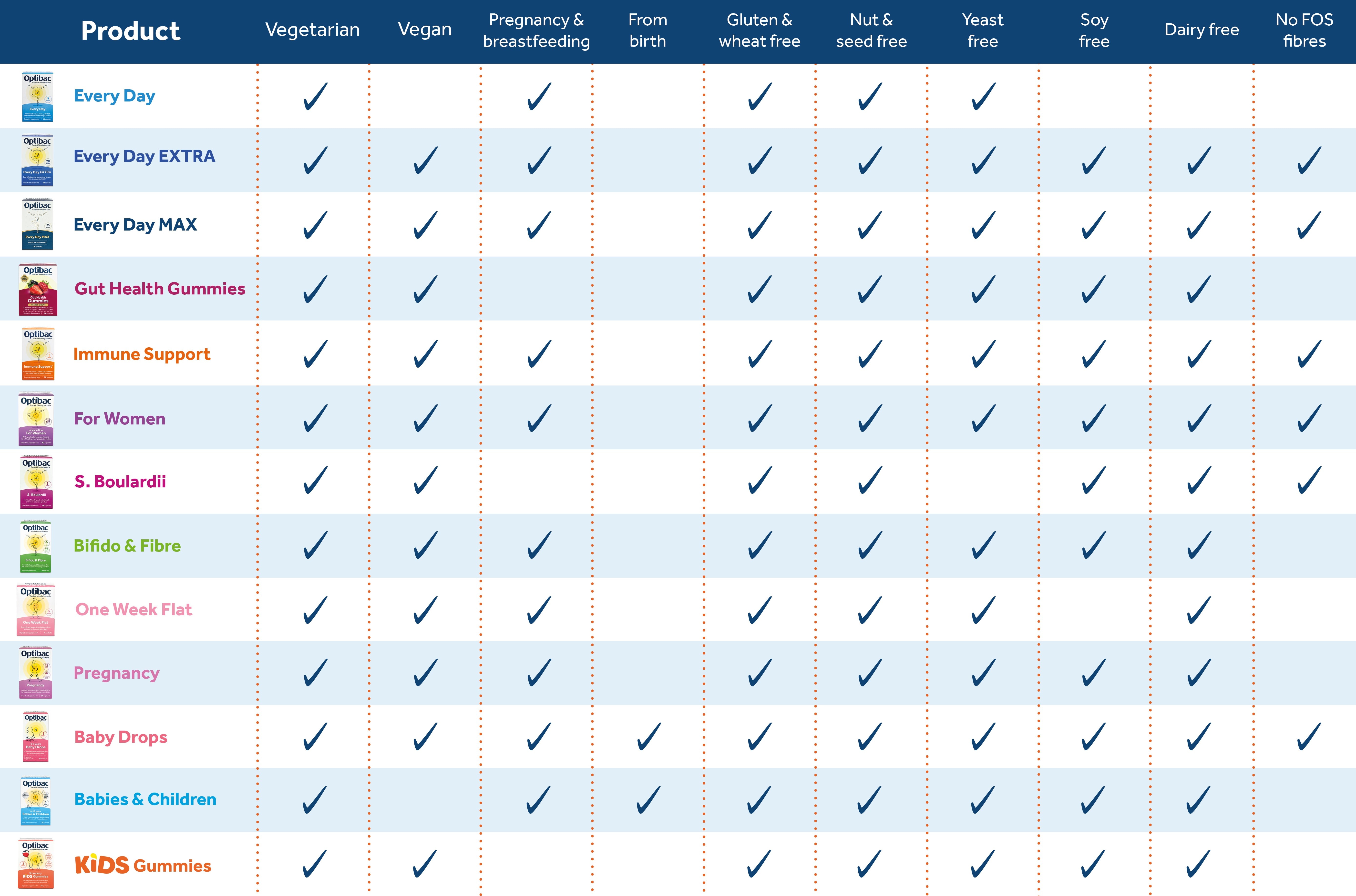You're away from FREE US delivery Free US delivery (applied at checkout) on orders over $60.00
You have qualified for Free US delivery
Suitability
Can I take probiotics if I have food allergies?
Yes, as long as you check the ingredients, you should be fine to take probiotic supplements if you have food allergies, though check with your doctor or allergy specialist if you are unsure. Read on to find information about any allergens in the Optibac range, as well as general information about allergies versus intolerances.
With food allergies on the rise, we recognise the importance of transparency when it comes to listing any potential allergens in our supplements. These are, of course, kept to a minimum wherever possible. However, in certain circumstances we cannot rule out trace amounts being present. The full ingredients FAQ covers every supplement in our range, and ingredients are listed on each product page. The chart at the bottom of this FAQ shows which of the products in our range are suitable for individuals with certain food allergies.

According to Allergy UK, recent studies have shown a significant increase in the incidences of food allergies over the last decade, in particular amongst children. Physical reactions to certain foods are becoming more and more common in general, but there are two different types of reaction that people can experience, and they both have different physiological causes and different lifestyle precautions involved in their management. It is therefore important to understand both types of reaction: food intolerances and food allergies, and the key differences between them.
Allergy vs Intolerance:
A true food allergy causes an immune system reaction that can affect numerous organs in the body. The bodies immune system is, for whatever reason, reacting to a normally harmless substance, and this can cause a whole range of different symptoms. In some cases, an allergic reaction to a food can be severe or even life-threatening.
The eight most allergenic foods are: milk, eggs, peanuts, tree nuts, soy, wheat, fish and shell fish. These 8 allergens between them account for approximately 90% of all food allergies 1. To read more about gluten free probiotics or dairy free probiotics, follow the links to the relevant FAQs.
In contrast, food intolerance symptoms are generally less serious and often limited to problems within the digestive tract. Food intolerances do not involve the immune system, instead they are usually the result of an enzyme deficiency. The most common food intolerance is lactose intolerance, which results from a lack of the enzyme lactase that breaks down the sugars in dairy products (find out more about lactose intolerance and our supplements).
A food intolerance can cause some of the same signs and symptoms as a food allergy, so people often confuse the two. Symptoms that can be common to both types of reaction include nausea, diarrhoea and stomach /abdominal pain. However, certain symptoms are specific to either type of reaction. Symptoms specific to food intolerance include bloating, gas and heartburn. Symptoms specific to food allergies include rash, hives, shortness of breath, swelling of the airways and chest pain.
Please be reassured that none of the Optibac supplements contain nuts.
Why are allergies on the rise?
We are really only just beginning to understand what it is that imbalances the immune system and pushes it towards the onset of allergies. Researchers have suggested that a number of factors might cause someone to become allergic. Current research includes the hygiene theory, which postulates that our environment has become too sterile, through the over-use of anti-bacterial cleaners and sterilising agents, to expose our immune system to a varied amount of micro-organisms and bacteria. Without this challenge the immune system does not develop properly. Therefore, infants are more likely to develop allergic conditions, such as eczema, asthma and food allergies.
Allergen information
The allergen information is different for each of the supplements in our range, so it is important to look at the nutritional information and suitability icons on each individual product page. Alternatively, we have grouped all of that information together in the following chart, which is also detailed in our Full ingredients FAQ.
For more information, visit our FAQs (there are lots!) or use the search tool in the top right hand corner to find what you are looking for.
This FAQ was last updated on 3rd July 2020.
Sources: 1. http://www.foodallergy.org/
Image: http://www.blueridgefamilychiropractic.net/page/allergies
Author: Kathy Wheddon, Nutritional Therapist DipION.
